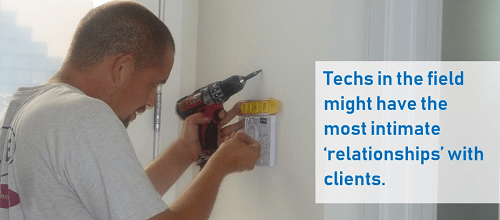
6.10.19 – CEPro – Julie Jacobson
Home-technology installation firms with more than a few employees typically divide work into sales and installation – an oversimplification, to be sure, but the folks in the field who run wires, hang TVs, and install cameras generally don’t sell additional gear to clients when they’re in the home.
Why not?
Technicians probably have the best feel for the “state of the home,” as they might “live” with a client all day … sometimes for months. They see everything – how the other trades interact with the client, how the pet dog is treated, when family and friends come and go, what irks and excites the residents, and most importantly what other technology is in the home and how the clients use it.
No matter how fine a salesperson or system designer might be, they won’t see that a homeowner keeps the shades down all day because it’s too much of a pain to raise and lower them. They might not notice that the exterior is pitch dark at night for lack of outdoor lighting, or that Dad just bought a TV online for his home office and could benefit from a soundbar or power protection.
The on-site techs, however, are in the perfect position to mention these challenges to the client:
You have such a great view; why don’t you enjoy it more often?
It’s challenging to pack up my van at night because it’s so dark in the front yard; have you considered a basic outdoor lighting system?
I notice that around 5:00 your Internet speeds really take a dive; have you noticed that?
Training Techs to Sell
The concept of installers selling upgrades or new products to clients is not new. Dish Network does an amazing job of it, training installers to recognize opportunities in the field for power protection, surround-sound, networking, TV mounting, improved cabling and the like. The techs carry spare products and parts in their vans for just such occasions, and are incentivized to sell additional gear or services.
Through Dish’s Smart Home Services, the satellite techs are cross-trained in these product categories, so they can not only sell the stuff, but also install and configure it on the spot, without an additional consultation or truck roll. It doesn’t get any more efficient than that, and as a bonus Dish improves the customer experience.
I have opined in the past that integrators are missing the lowest-hanging fruit on two counts. First, they fail to communicate systematically with existing clients to ensure customers remain happy, recommend you to friends, and keep coming back for more.
Second is the fact that the folks in the field might have the most intimate “relationship” with clients, but can’t parlay those relationships into additional sales and improved customer experiences.
At the recent spring meeting of the ProSource buying group, I was lucky enough to spend quality time with Walton Stinson, co-founder and president of the successful Denver-based home-tech retailer/integrator ListenUp, and member of ProSource’s board.
I asked him how he spent most of the time these days, and he said he personally was focusing on “people development.”
Most recently, he says, ListenUp has been working on strategies to help techs sell stuff, much like the scenarios above. I lit up: My gosh, this has always been the low-hanging fruit!
Not only could ListenUp enjoy new revenues and improved customer experiences, but the company could also provide a nice career bath for techs who might be interested in sales.
We wondered together why this wasn’t more of a “thing” in our industry. Techs seem to be trained to do specific tasks, and to refrain from fraternizing with clients. Do the dedicated sales personnel resist or resent any encroachment on their turf? Do company principals worry that techs can’t communicate properly with clients? Or are systems simply not in place to facilitate on-the-job sales and installations?
If you answered yes to any of these questions … don’t worry, the obstacles are all fixable through hiring practices, training, operational systems, company culture and most importantly a commitment to making it happen.
We would love to hear from integrators about any experiences with in-the-field sales
